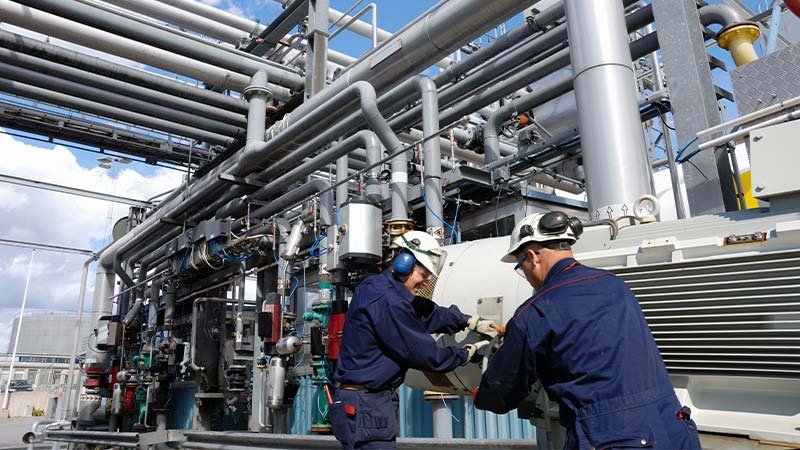In a move that could reshape the way Nigerian industries function, Schneider Electric has launched a new generation of smarter machines designed to boost productivity, reliability, and sustainability. These machines—powered by edge computing and Human-Machine Interface (HMI) technology—promise to give local industries the ability to run more efficiently, even in the face of Nigeria’s persistent challenges with power supply and internet connectivity.
At the launch, Schneider Electric’s Country President, Ajibola Akindele, described the solutions as a “turning point” for local businesses. “For industries in Nigeria, business continuity depends on resilience,” he said. “Smarter machines ensure that operations keep running, decisions are faster, and downtime is drastically reduced.”
This announcement marks not just a product unveiling but also a clear signal that Nigeria is ready to join the global conversation around industrial automation and digital transformation.
Table of Contents

Local Solutions for Local Challenges
Nigeria’s industrial sector, from food processing to oil and gas, often struggles with two core issues: erratic power and inconsistent internet connectivity. These problems not only disrupt operations but also increase costs and reduce competitiveness. Schneider Electric’s approach is to bring intelligence directly to the machines themselves through edge computing.
Unlike traditional cloud systems that depend heavily on constant connectivity, edge computing processes data locally, on the device or within the factory. This means operators can make real-time decisions without waiting for data to travel back and forth from remote servers. For industries that cannot afford delays—like oil rigs or food processing lines—this autonomy is invaluable.
Coupled with this is Human-Machine Interface (HMI) technology, which gives operators an interactive dashboard to monitor, control, and respond to issues immediately. For instance, a processing plant can detect overheating equipment and act instantly, preventing expensive breakdowns.
Already, some Nigerian firms in the food and beverage industry are piloting these tools. Operators report faster decision-making, less downtime, and clearer oversight of their production lines. In oil and gas, where sites are often remote, the ability to monitor and act without internet dependence has been described as a “game-changer.”

Riding the Wave of Global Industrial Automation
The launch of these smarter machines places Nigeria in step with global industrial automation trends. Analysts forecast that the industrial edge computing market will grow from $21.2 billion in 2025 to $44.7 billion by 2030, with an annual growth rate above 16%. Similarly, the Human-Machine Interface market is projected to hit $7.7 billion by 2028.
For Africa and the Middle East, industrial automation as a whole is expected to expand from $3.67 billion in 2024 to $6.16 billion by 2032. Nigeria is already seen as a focal point for this growth, with its digital transformation market predicted to reach $11.7 billion by 2025.
This timing makes Schneider Electric’s unveiling particularly strategic. By introducing cutting-edge but practical tools that address Nigeria’s realities, the company is aligning global technological trends with local needs. It is not about importing solutions wholesale—it is about adapting them to work within Nigeria’s specific context.
Akindele highlighted this point during the launch: “Smarter machines are not a luxury. They are a necessity for industries to survive in a volatile environment. By processing data locally and empowering operators with intuitive interfaces, businesses gain resilience and competitive advantage.”
Beyond Technology: Investing in People
Schneider Electric is not stopping at machines. The company recognises that without skilled people to maintain and adapt these systems, innovation cannot thrive. To this end, it has committed resources to training Nigerian engineers and technicians in edge computing, industrial automation, and HMI technology.
Through partnerships with universities, technical institutions, and industry associations, Schneider Electric is building a talent pipeline to support the country’s digital future. This is a crucial investment, given Nigeria’s youthful population and the growing demand for technical expertise.
A senior engineer at the launch, who has worked with Schneider Electric on pilot projects, explained: “What excites me is not just the machines, but the training that comes with them. We are learning to manage and adapt technology to fit our reality. That means we are not just consumers of innovation—we are part of creating it.”
This focus on people is what could set Schneider Electric apart. While technology provides immediate solutions, capacity building ensures that Nigeria remains self-reliant in the long term. It creates a workforce capable of innovating, adapting, and competing globally.

Conclusion
The unveiling of smarter machines to power Nigerian industries represents more than a corporate milestone—it is a vision for how Nigeria can embrace modern industry while solving its own local challenges. By combining edge computing with HMI, Schneider Electric has presented tools that can withstand unreliable power and connectivity, two issues that have long frustrated Nigerian manufacturers.
Backed by global market trends and anchored in local realities, this move could unlock new levels of productivity for sectors as diverse as food processing, oil and gas, and consumer goods. More importantly, by investing in people and building technical capacity, Schneider Electric is ensuring that the benefits of this transformation remain sustainable.
As industries adopt these smarter machines, the real story may not just be about efficiency—it may be about resilience, independence, and Nigeria’s readiness to power its future with technology that truly understands its environment.
Join Our Social Media Channels:
WhatsApp: NaijaEyes
Facebook: NaijaEyes
Twitter: NaijaEyes
Instagram: NaijaEyes
TikTok: NaijaEyes




